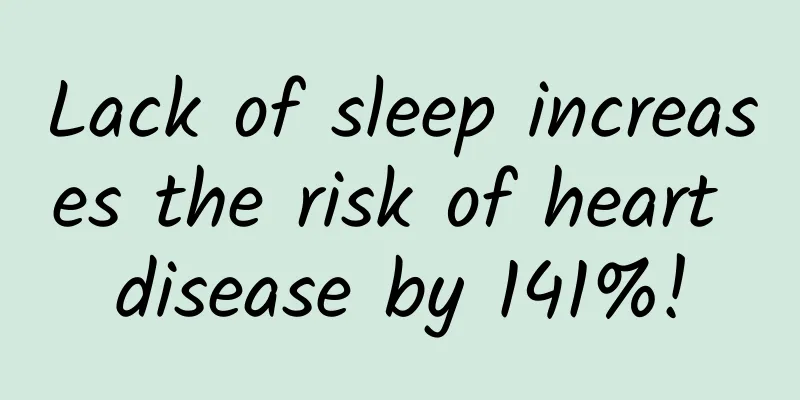Lack of sleep increases the risk of heart disease by 141%!

|
A study recently published in Scientific Reports found that poor sleep quality may damage heart health and increase the risk of heart disease by 141%. The study reviewed sleep data from 6,820 U.S. adults, with an average age of 53, who self-reported their personal sleep characteristics and heart disease history. Of the participants, 633 wore a research device (an actigraph) on their wrist to capture their sleep activity. The researchers looked at multiple aspects of sleep health, such as regularity, satisfaction, alertness while awake, sleep duration, sleep efficiency and sleep duration, and linked them to doctor-diagnosed heart disease. The researchers found that for each additional self-reported sleep health problem, the risk of heart disease increased by 54 percent. Among those who provided sleep data both through self-reporting and research devices, the increased risk of heart disease due to poor sleep health was much higher — a 141 percent increase, a figure considered more accurate. "These findings suggest that understanding a person's 'sleep health problems' is important for assessing heart disease risk. This study is the first to demonstrate that more sleep health problems may increase heart disease risk in middle-aged adults," said Soomi Lee, assistant professor in the USF School of Aging Studies and the study's lead author. "Those who provided both self-reported and monitored sleep data had a higher risk, suggesting that accurate and comprehensive measurement of sleep health is important for preventing heart disease." The research team asked participants about their health, including whether their doctor had confirmed they had heart disease such as arrhythmias, heart murmurs or an enlarged heart. High blood pressure was flagged as a risk factor for heart disease. They also looked at participants' family history of heart disease and sociodemographic factors such as race, sex, smoking history, depression and physical activity. The researchers found that while women reported more sleep health problems, men were more likely to have heart disease, but gender did not affect the overall correlation between the two factors. They also found that black participants had more sleep health problems and higher rates of heart disease than white participants, but the strong link between sleep health and heart disease did not change overall by race. Lee said that while sleep health is important for people of all ages, the team focused on midlife because it is a longer period and has more diverse life experiences and greater stress due to work and family roles. This stage is also when heart disease and age-related sleep problems begin to emerge. Because sleep health can be improved, the findings could help develop preventive strategies to reduce the risk of heart disease, the researchers said. Source: China Science Daily Author: Li Muzi Related paper information: https://www.nature.com/articles/s41598-022-05203-0 The pictures in this article with the "Science Popularization China" watermark are all from the copyright gallery. The pictures are not authorized for reprinting. |
<<: 22 satellites in one rocket! Long March 8 opens a new model of shared rocket "carpooling"
>>: Cooking food without heating it? It's possible...
Recommend
The turtle tested positive for cholera! Can we still eat and drink it safely? !
On the evening of July 9 this year, the Wuchang D...
A great migration in the sky
“No migratory bird flies in a straight line” This...
What are the effects and functions of Trichosanthes?
Many people are familiar with Radix Trichosanthis...
The V-2 rocket that landed on the wrong planet
Although the Treaty of Versailles signed in 1919 ...
Picture of ground cucumber
Ground cucumber is a perennial herb with a long m...
Attention! Do not take painkillers for stomachache!!!
With the increasing pressure of work, the acceler...
The effects and functions of tung seeds
Many people are not very clear about the mulberry...
What are the ingredients of Chuanbei cough syrup?
As time goes by and we age, our bodies will becom...
Another breakthrough in AI! Identifying children's "invisible killer" before the age of 1, with an accuracy rate of over 80%
Autism is becoming the "invisible killer&quo...
The difference between Panax notoginseng and Panax notoginseng
The difference between Panax notoginseng and Pana...
Chinese Stars丨A picture will help you clarify the difference between "boat" and "boat"
How much do you know about "Shenzhou" a...
What is the function of human albumin
Speaking of human albumin, many friends don’t kno...
Chinese patent medicine for laxative
We often eat some dry food at night. Now is the e...
The efficacy and function of Longjiang Saussurea
Many people are very familiar with Longjiang Saus...









